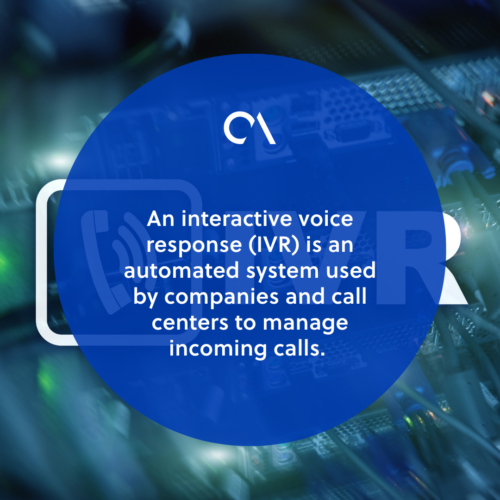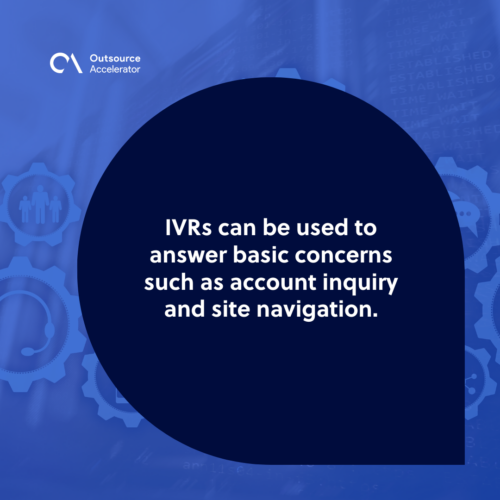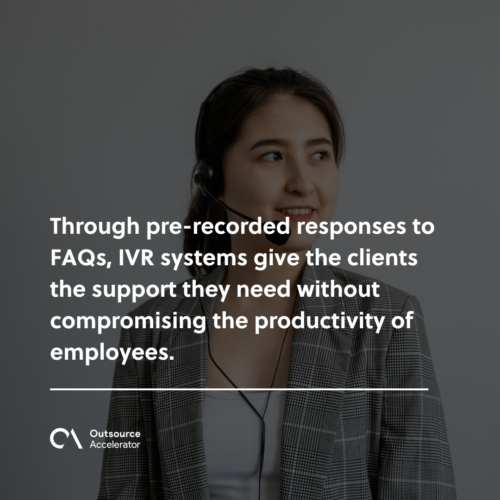IVR call center: Benefits, processes, and nature

In any call center company, ensuring that all queries and customer concerns are handled is crucial. It goes beyond brand promise and more into understanding the trends and patterns experienced by end-users.
To ensure that all operations and systems are functioning, call center companies implement various customer service technologies to manage thousands of calls per day.
One of these technologies is the IVR system. It is the most cost-effective way to manage the deluge of calls and redirect the clients to the most qualified personnel for their concerns.
This article explains how IVRs work in a call center and provides information about their benefits.
What is an IVR call center?
An interactive voice response (IVR) is an automated system used by companies and call centers to manage incoming calls.
The system serves as a receptionist, which provides different options for end-users to follow to receive the help they need.
The IVR call center system empowers the users to be more self-reliant by finding the answers to frequently asked questions on the company’s website or reverting to message support for matters that are not urgent.
The main advantage of IVR in a call center is that it maximizes the capabilities and time of employees. Agents can perform high-level tasks in addition to handling calls and answering basic inquiries.
Using IVR in a call center also enhances customer experience with the fast and reliable service it provides to its callers. They then save a lot of time as they do not need to wait long in line or expect a callback.

Functions of IVR systems in a call center
Essentially, the IVR call center promises first-contact resolution of concerns by maximizing the time and effort of agents.
Instead of focusing on high quota performance, it will be directed to the quality resolution of concerns and technical issues requiring advanced expertise. IVR software allows contact center teams to route calls to the most appropriate agent that can answer a client’s concern.
Apart from this, IVR in a call center has other functions, such as the following:
- Handling simple concerns. IVRs can be used to answer basic concerns such as account inquiry and site navigation.
- Lowering costs. Fewer agents are needed to address thousands of redundant concerns.
- Directing callers to the right department. IVRs can be used to redirect callers to appropriate departments.
- Reducing waiting time. Clients are given the option for a callback to avoid wait time.
- Improving call management. Customers are encouraged to switch to live chat support instead of talking to agents for simple concerns.
- Gathering information. Customer details are collected for the agents to process the concerns on their end without live calls.
Call center IVR systems are mostly used by teams handling volumes of inbound calls on behalf of a business.

How does the IVR call center work?
The IVR system receives the call and presents various options to the customer. The caller selects an option through the keypad of their phone or telephone.
The IVR will ask for additional information and will process it depending on the selection given. After that, the IVR system will process the call by routing the caller to the appropriate department or scheduling a callback.
In cases of advanced IVR systems, additional features include:
- Mute and hold
- Warm transfer
- Conferencing
- Self-service options
- IVR menu options
- Call recording
- Tailor-fitted greetings
Benefits of IVR call center
In general, IVR systems are created to help businesses increase customer satisfaction in terms of handling calls.
There are other benefits that IVRs in a call center offer. This includes the following:
Better time management
Part of good customer service is prompt issue resolution. A faster and shorter handling time period can improve this.
IVRs enable agents to provide assistance in a smarter and more efficient way. They do not need to spend most of their time on simple tasks but create more value by assisting with complex issues.
Especially for call center companies, the IVR technology can be programmed to accommodate calls by:
- Splitting the calls into different types of categories and groups
- Assigning agents to these formed groups in which they will resolve the problems
- Providing pre-recorded FAQs
- Scheduling callbacks in the event that agents are preoccupied with other calls
- Rerouting calls through a ticketing system
This reduces the hold and wait time, enabling both agents and callers to spend their time on productive things.
Higher first-contact resolutions
Clients do not want circuitous processes and unresolved queries. As much as possible, they look forward to prompt calls from the first agent they encounter.
Warm transfers between departments irritate them as it entails more hold time for them. The IVR system removes this by directing the callers to the appropriate agent right away.
In turn, this can enhance a company’s first contact resolution.

24/7 support
With clients all over the world, having 24/7 customer service is becoming in demand and necessary.
This proves better customer service which clients value and look for. The good thing about an IVR system is that it supports 24/7 customer support.
Through pre-recorded responses to FAQs, IVR systems give clients the support they need without compromising employees’ productivity. This is especially applicable to companies that cannot provide 24/7 support.
This system comes in handy during the holiday season, product launches, emergencies, and other situations in which employees cannot answer the call personally.
IVR in a call center: a game changer in customer support
The IVR call center sets the customer service capabilities and expectations a bit higher. It goes beyond faster issue resolution to increasing the company’s capability to scale.
With this reliable technology at hand, companies can be with and for their customers all the time. They can get more reliable data on common concerns through the ticketing system and, in turn, create programs or projects aimed at resolving frequent concerns.







 Independent
Independent




